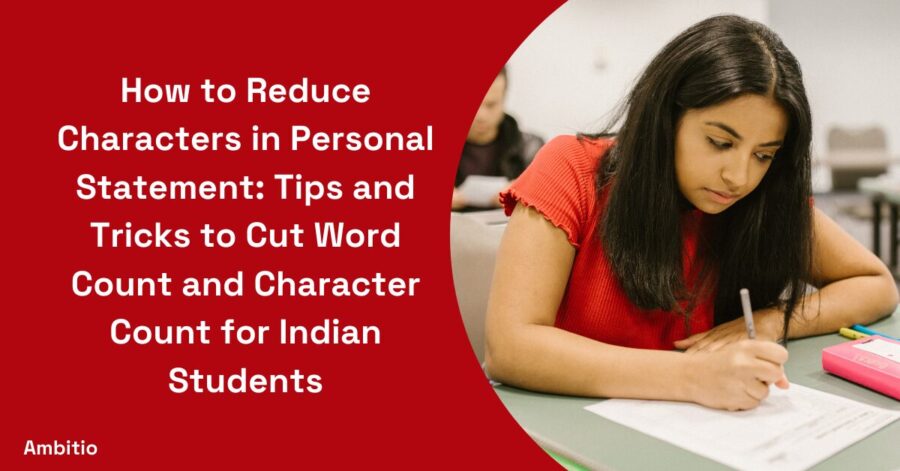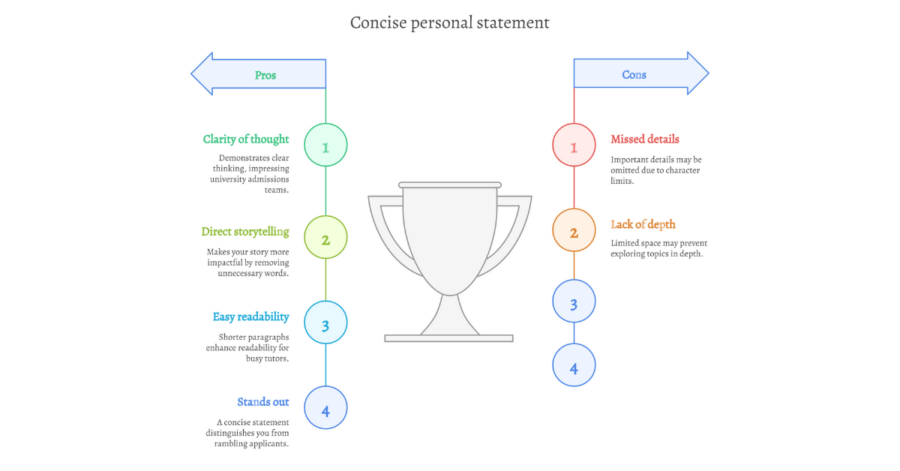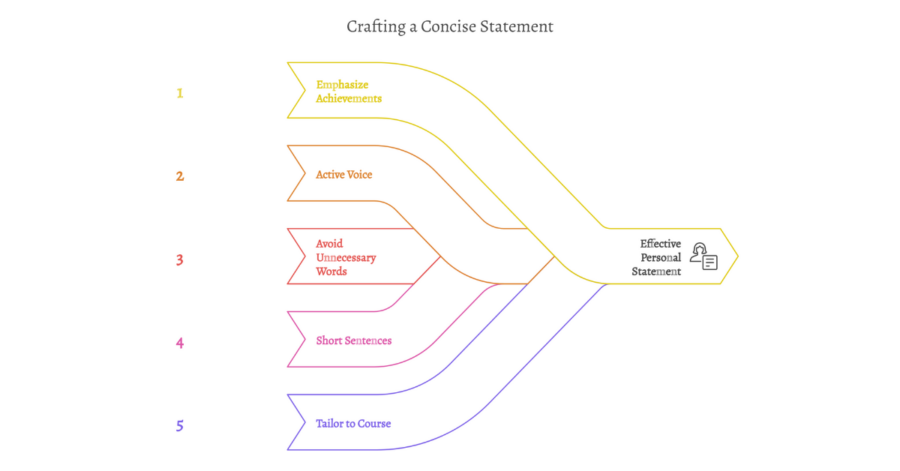6 May 2025
4 minutes read
How to Reduce Characters in Personal Statement: Tips and Tricks to Cut Word Count and Character Count for Indian Students

Key Takeaways
- How to reduce characters in personal statement is by cutting filler words and using active voice to maintain clarity within the UCAS limit.
- How to reduce characters in personal statement involves removing less important details and focusing only on course-relevant content.
- How to reduce characters in personal statement requires editing each sentence carefully to avoid passive voice and unnecessary adjectives.
Writing the ideal personal statement can be thrilling and draining. You have only a couple of hundred words to express why you are the best candidate, and keeping within the character limit seems daunting. Most Indian students find it difficult to pack passion, purpose, and experience into a limited space.
This guide provides a simple method for cutting your statement without diminishing effect. It is similar to a hack to be brief and strong simultaneously. From eliminating filler words to refining grammar, this is your definitive guide to making you cut the word count wisely.
What is a Personal Statement?
A personal statement and statement of purpose are your chances to tell your story to the institution. It forms a key section of your UCAS application and helps admissions tutors understand your motivation and goals. Whether you apply for medicine, engineering, or business, this document reflects your journey.

It includes your work experience, academic interests, and the reason you want to pursue a course. Colleges and medical schools across the world, especially in the UK and USA, consider it an essential part of your acceptance process. Keep your sentences crisp and honest. When written well, your statement can get you shortlisted for interviews.
Why Reduce Characters in Your Personal Statement?
Did you know the UCAS character mark is 4,000 characters or 47 lines, whichever comes first? If you exceed it, your application won’t go through.
Here are some easy ways to stay within the guidelines:
- UCAS has a strict 4000-character limit, including spaces and punctuation.
- Editing shows clarity of thought, which impresses university admissions teams.
- You get rid of extra words, making your story more direct.
- Shorter paragraphs are easier to read, especially for busy tutors.
- A concise statement stands out, especially when others ramble.
What are Some Important Things to Remember While Writing Your Personal Statement?
Did you know that tutors and student rooms often read hundreds of statements in a day? That means your essay must catch their attention fast.
Here are five important things to note:
- Emphasize on your achievements instead of listing them.
- Use active voice to show energy.
- Avoid adverbs and adjectives that don’t add value.
- Make every sentence matter; shorten sentences and remove fillers.
- Tailor the statement to your course and not just your general profile.
Here’s a quick comparison of what to keep and what to remove:
| Keep | Remove |
|---|---|
| Specific work experience | Unnecessary adjectives |
| Relevant academic interests | Passive voice |
| Clear phrases and examples | Long, complex sentences |
| Strong introduction and end | Fillers and repetition |
| Course-specific motivation | Less important information |
Sample UCAS Personal Statement (With Reduced Word Count)
Given below is a sample personal statement written within the UCAS guidelines. This version has been condensed to stay within 4000 characters while still emphasizing the applicant’s strengths.
“My name is Anjali Mehta, and I am applying to the BSc Psychology course at University College London. This personal statement captures my passion, journey, and academic experience in under the character limit.”
“Ever since I volunteered at a mental health awareness camp in Mumbai, I knew I wanted to study psychology. Watching professionals change lives with empathy and evidence-driven methods fascinated me. My school coursework in biology and sociology shaped my scientific thinking. I also scored 1450 in the SAT and achieved an 8.0 band in IELTS.
Outside the classroom, I interned with MindMatters India, where I helped design mental health resources for teenagers. This experience taught me how community support works in real-world scenarios. It also inspired me to write a research paper on social stigma around mental health, which won second place in a national competition.
I believe psychology can be used to empower individuals. UCL’s research-driven approach and the opportunity to work in diverse teams excite me. I aim to pursue further research in adolescent mental health. This course will help me develop the right skills for that path.”
Top 5 Study Abroad Destinations Where Your Personal Statement Matters
Did you know that in countries like the UK and USA, a strong personal statement can sometimes carry more weight than your GPA?

That’s why you must understand how much each institution values this document:
| Sl. No. | Country | Institution | Fee (Annual) | Personal Statement Requirement | Programs Offered |
| 1 | UK | University of Oxford | £39,000 | Yes, highly evaluated by admissions tutors | Law, Medicine, PPE |
| 2 | UK | University of Cambridge | £37,500 | Required; part of application | Engineering, Natural Sciences |
| 3 | USA | Harvard University | $54,000 | Required; part of Common App Essay | Medicine, Law, Business |
| 4 | USA | Stanford University | $56,000 | Personal Statement | Engineering, Business, Arts |
| 5 | UK | London School of Economics | £35,000 | Required; academic-focused personal statement | Economics, Law, Politics |
Conclusion
Cutting characters in a personal statement is an art and a skill. With the UCAS application system having a fixed mark, Indian students must plan carefully. Use tools like grammar checkers and statement editors to remove unnecessary words and adverbs.
Focus on active voice and tailor your paragraph to your chosen course. By applying little tricks, cutting filler words, putting in some struggle and reading your application aloud, you will find the best way to cut words without losing meaning. Whether you apply for medicine or engineering, your statement should reflect who you are in a concise and impactful way.
Now, go ahead and choose Ambitio and edit your draft like a pro!
FAQs
What is the easiest way on how to reduce characters in personal statement?
The easiest way on how to reduce characters in personal statement is by cutting filler words, removing redundancy, and using concise phrases instead of long descriptions.
How to reduce characters in personal statement without losing important content?
To know how to reduce characters in personal statement without losing value, prioritize key experiences and reflect only what matters most to the course and university.
How to reduce characters in personal statement when applying for medicine?
When learning how to reduce characters in personal statement for medicine, focus on clinical work experience, relevant skills, and keep your sentences sharp and focused.
How to reduce characters in personal statement to meet the UCAS character limit?
A smart method on how to reduce characters in personal statement is to check every sentence for unnecessary words and stay within the 4000-character UCAS limit.
How to reduce characters in personal statement while keeping it personal and compelling?
To master how to reduce characters in personal statement and still make it personal, choose impactful phrases, avoid passive voice, and highlight real examples briefly.
How to reduce characters in personal statement for international applications like IELTS or SAT?
For tests like IELTS or SAT, how to reduce characters in personal statement involves using clear, formal English and sticking to content that supports your academic goals.
How to reduce characters in personal statement without affecting grammar and tone?
Understanding how to reduce characters in personal statement means using strong verbs, skipping unnecessary adverbs, and maintaining a natural yet formal tone throughout.

You can study at top universities worldwide!
Get expert tips and tricks to get into top universities with a free expert session.
Book Your Free 30-Minute Session Now! Book a call now




























